
Boris Abramovich Berezovsky, also known as Platon Elenin, was a Russian business oligarch, government official, engineer and mathematician. He was a member of the Russian Academy of Sciences. Berezovsky was politically opposed to the President of Russia Vladimir Putin from Putin's election in 2000; he remained a vocal critic of Putin for the rest of his life. In late 2000, after the Russian Deputy Prosecutor General demanded that Berezovsky appear for questioning, he did not return from abroad and moved to the UK, which granted him political asylum in 2003. In Russia, Berezovsky was later convicted in absentia of fraud and embezzlement. The first charges were brought during Primakov's government in 1999. Despite an Interpol Red Notice for Berezovsky's arrest, Russia repeatedly failed to obtain the extradition of Berezovsky from Britain; the situation became a major point of diplomatic tension between the two countries.

Ivan Petrovich Rybkin is a Russian politician. He was Chairman of Russia's State Duma in 1994–96 and Secretary of the Security Council in 1996–98. He ran for the Russian presidency in 2004, before dropping out after allegedly being kidnapped and drugged by Russian state Federal Security Service (FSB) officers.

Christopher John "Kit" Hesketh-Harvey is a British musical performer, translator, composer and screenwriter.

On 7 October 2006, Russian journalist, writer and human rights activist Anna Politkovskaya was shot dead in the elevator of her apartment block in central Moscow. She was known for her opposition to the Chechen conflict and for criticism of Vladimir Putin. She authored several books about the Chechen wars, as well as Putin's Russia, and received numerous international awards for her work. Her murder, believed to be a contract killing, sparked a strong international reaction. Three Chechens were arrested for the murder, but were acquitted. The verdict was overturned by the Supreme Court of Russia and new trials were held. In total, six people were convicted of charges related to her death.

Alexander Valterovich Litvinenko was a British-naturalised Russian defector and former officer of the Russian Federal Security Service (FSB) who specialised in tackling organized crime. Litvinenko coined the phrase "mafia state".
Sergei Yushenkov was a liberal Russian politician. He was assassinated on 17 April 2003, just hours after registering his political party to participate in the December 2003 parliamentary elections.
The International Foundation for Civil Liberties is a non-profit organization established by the Russian-British oligarch Boris Berezovsky in November 2000. The foundation is headquartered in New York City and headed by Alexander Goldfarb. The stated mission of the foundation is "to provide financial, legal, informational and logistical resources to secure human rights and civil liberties in Russia."
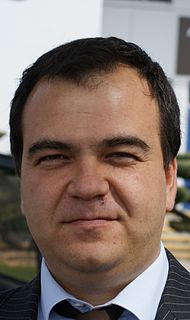
Mario Scaramella is a lawyer, security consultant and academic nuclear expert. He came to international prominence in 2006 in connection with the poisoning of the ex-FSB agent Alexander Litvinenko. As responsible for intelligence analysis and production on KGB and military GRU espionage in Europe, he served as an investigator and adviser to the Mitrokhin Commission. Scaramella was a suspect by the Italian justice department for calumny.

Andrey Konstantinovich Lugovoy, also spelled Lugovoi, is a Russian politician and businessman and deputy of the State Duma, the lower house of the Russian parliament, for the LDPR. He worked as a KGB bodyguard and as head of "Ninth Wave", a security firm. He is wanted by British police on suspicion of the murder of Alexander Litvinenko, a former KGB and later FSB officer. Russia has rejected the request for his extradition.
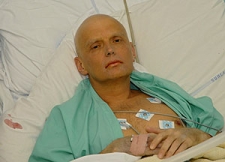
Alexander Litvinenko was a former officer of the Russian Federal Security Service (FSB) and KGB. After speaking critically about what he saw as corruption within the Russian government, he fled retribution to the UK, where he remained a vocal critic of the Russian state. Six years after fleeing, he was poisoned by two Russians in a suspected assassination.
Anthony Bolton was until his retirement a UK investment fund manager and successful investor having managed the Fidelity Special Situations fund from December 1979 to December 2007. Until his retirement in April 2014 he then managed Fidelity China Special Situations PLC, a London Stock Exchange listed investment trust.
Dmitri Vladimirovich Kovtun is a Russian businessman and ex-KGB agent who is also suspected to have murdered the ex-spy Alexander Litvinenko in London. Kovtun was also hospitalised with radiation poisoning.
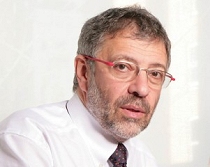
Alexander Davidovich Goldfarb is a Russian-American microbiologist, activist, and author. He emigrated from the USSR in 1975 and studied in Israel and Germany before settling permanently in New York in 1982. Goldfarb is a naturalized American citizen. He has combined a scientific career as a microbiologist with political and public activities focused on civil liberties and human rights in Russia, in the course of which he has been associated with Andrei Sakharov, George Soros, Boris Berezovsky, and Alexander Litvinenko. He has not visited Russia since 2000.
Nikolay Alekseevich Glushkov was a Russian businessman who was the deputy director of Aeroflot and a finance manager for AvtoVAZ who died at suspicious circumstances. After claiming that Aeroflot worked as a "cash cow to support international spying operations", he was arrested and tried in Russia on the allegation of funnelling Aeroflot money through another company in 1999. He was convicted and released in 2004, after serving three years. He emigrated to the UK in 2010 and received political asylum. In 2017, he was convicted in absentia in Russia for allegedly stealing money from Aeroflot, but his extradition from Britain had been denied. Initially treated as "unexplained", his death is being investigated by the Metropolitan Police who are treating it as a murder inquiry. On 9 April 2021, the West London Coroner's Court ruled Glushkov was unlawfully killed, with injuries consistent with strangulation.
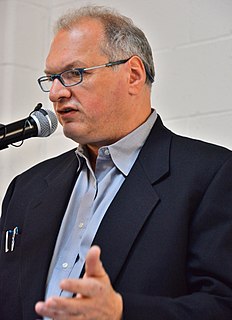
Yuri Georgievich Felshtinsky is a Russian American historian. Felshtinsky has authored a number of books on Russian history, including The Bolsheviks and the Left SRs, Towards a History of Our Isolation, The Failure of the World Revolution, Blowing up Russia, and The Age of Assassins.

Lubyanka Criminal Group is a book by Alexander Litvinenko about the alleged transformation of the Russian Security Services into a criminal and terrorist organization.
The poison laboratory of the Soviet secret services, alternatively known as Laboratory 1, Laboratory 12, and Kamera, was a covert research-and-development facility of the Soviet secret police agencies. The laboratory manufactured and tested poisons; it reportedly reactivated in the late 1990s.
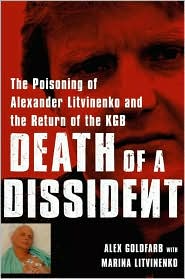
Death of a Dissident: The Poisoning of Alexander Litvinenko and the Return of the KGB is a book written by Alexander Goldfarb and Marina Litvinenko about the life and death of her husband, former FSB officer Alexander Litvinenko who was poisoned by the radioactive element polonium in London in November 2006.

Grange Park Opera is a professional opera company and charity whose base is West Horsley Place in Surrey, England. Founded in 1998, the company staged an annual opera festival at The Grange, in Hampshire and in 2016-7, built a new opera house, the 'Theatre in the Woods', at West Horsley Place – the 350-acre estate inherited by author and broadcaster Bamber Gascoigne in 2014.

Rebellion: The Litvinenko Case, distributed as Poisoned by Polonium, is a 2007 Russian documentary film covering the death of ex-Russian spy and dissident, Alexander Litvinenko, who was assassinated in London, United Kingdom in 2006. It was directed by Russian filmmaker Andrei Nekrasov and written by Nekrasov and producer Olga Konskaya.













